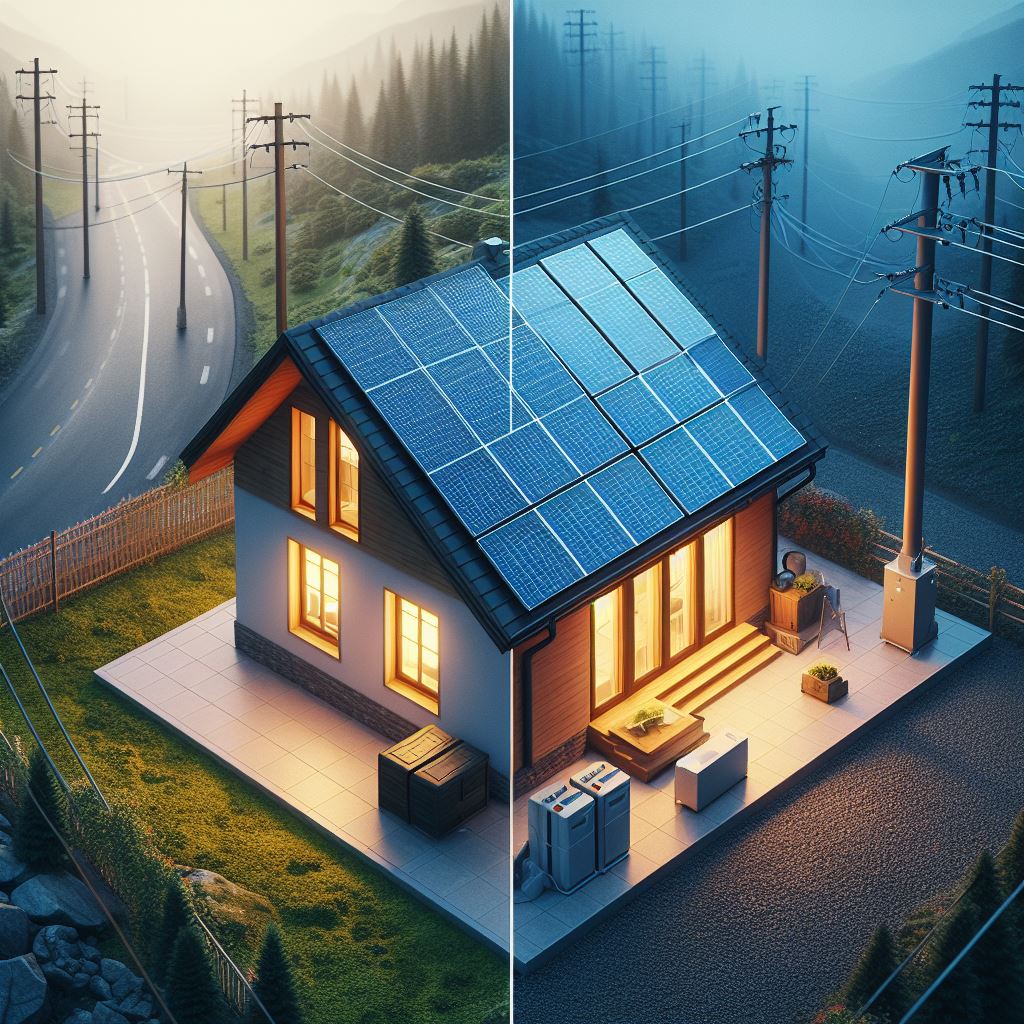Considering solar power for your small business? On-Grid Solar System vs. Off-Grid? This guide dives deep into both options, helping you choose the best fit for your energy needs and budget.
Introduction
Harnessing the sun’s power can significantly reduce your small business’s energy bills and carbon footprint. But with two main solar system options – on-grid and off-grid – choosing the right one can be overwhelming. This comprehensive guide will break down the key differences between on-grid and off-grid solar systems, empowering you to make an informed decision for your business’s sustainable future.
Understanding On-Grid Solar Systems
What is it?
An on-grid solar system, also known as a grid-tied system, connects directly to the utility grid. Solar panels convert sunlight into electricity that flows through an inverter, converting it to usable AC power. This AC power first meets your business’s energy needs. Any excess electricity produced during peak sunshine hours is fed back to the grid.

Benefits:
- Lower electricity bills: On-grid systems significantly reduce your reliance on the utility grid, leading to substantial savings on electricity bills.
- Net metering programs: Many utilities offer net metering programs, where you receive credits for excess electricity fed back to the grid. These credits can be used to offset future electricity usage.
- Lower upfront costs: On-grid systems typically have lower upfront costs compared to off-grid systems because they don’t require battery storage.
- Simpler maintenance: On-grid systems require minimal maintenance as the utility company manages the grid infrastructure.
Considerations:
- Power outages: During power outages, on-grid systems won’t function unless you have a battery backup system installed.
- Grid dependence: You remain reliant on the utility grid for any electricity needs exceeding solar production.
Delving into Off-Grid Solar Systems
What is it?
An off-grid solar system operates independently of the utility grid. It includes solar panels, an inverter, and a large battery bank to store excess solar energy for use during nighttime or periods of low sunlight. This system makes your business completely self-sufficient in terms of electricity generation.
Benefits:
- Energy independence: Off-grid systems offer complete freedom from the utility grid, providing energy security and resilience against power outages.
- Environmentally friendly: Off-grid systems have a smaller carbon footprint as they rely solely on renewable solar energy.
Considerations:
- Higher upfront costs: Off-grid systems require a significant upfront investment due to the additional cost of battery storage.
- System complexity: Off-grid systems require careful design and sizing of solar panels, battery banks, and inverters to ensure they meet your business’s energy needs year-round.
- Maintenance: Off-grid systems require regular maintenance of batteries and other components.
on-grid vs off-grid which is better
Most of the time, on-grid solar systems are the least expensive choice. You’ll be able to save money on your regular electricity bill and make money through credits. Off-grid is harder to do and costs more up front because it needs more tools, like expensive battery banks, to work.
The Basics: How On-Grid and Off-Grid Solar Systems Work:
On-grid solar systems primarily consist of solar panels, inverters, and occasionally a bi-directional meter. Solar panels capture sunlight and convert it into direct current (DC) electricity, which is then transformed into alternating current (AC) electricity by the inverter, suitable for powering household or commercial appliances. Any surplus electricity generated during periods of high solar irradiance is fed back into the grid, often resulting in credits or compensation for the system owner. Off-grid solar systems, on the other hand, require additional components such as batteries and charge controllers to store excess energy for use during periods of low sunlight, ensuring a continuous power supply.
Cost Considerations: On-Grid vs. Off-Grid Solar Installations:
The cost dynamics between on-grid and off-grid solar installations vary significantly due to differences in equipment, installation, and maintenance requirements. Generally, on-grid solar systems tend to be more cost-effective upfront since they do not necessitate expensive battery storage solutions. However, additional expenses such as grid connection fees and bi-directional meters may apply. Off-grid systems typically incur higher initial investments due to the inclusion of batteries and other ancillary components necessary for energy storage. Nonetheless, off-grid systems offer long-term savings by eliminating monthly electricity bills and providing energy independence, particularly in remote areas.
Electricity Expenses with an Off-Grid System
When your photovoltaic (PV) system operates independently of the grid, you can bid farewell to monthly electric bills altogether. However, it’s worth noting that while you may eliminate the traditional electric bill, the initial investment for an off-grid system tends to be higher. This is primarily due to the additional equipment required, such as batteries, to ensure a reliable power supply without grid connectivity.
Electricity Costs with a Grid-Tied System
Opting for a grid-tied solar system doesn’t necessarily mean saying goodbye to all charges on your electricity bill, even if your solar installation covers 100% of your energy needs.
One type of charge you might encounter is the service fee or delivery charge, which utilities impose for connecting your property to the grid. Often, this fee remains consistent regardless of your energy consumption.
Another potential charge is demand charges, typically applicable to commercial properties. These charges reflect the higher electricity rate incurred during peak demand periods, typically defined as the 15-minute interval when your property utilizes the most energy.
As heavy electricity usage during peak times strains the grid, utilities impose higher rates for power consumed during these periods. Solar energy production can help mitigate this expense, particularly if your peak demand coincides with daylight hours, allowing your solar system to offset a portion of your grid reliance.
For those facing significant demand charges, exploring options such as peak demand shaving with solar and battery storage may offer additional savings and efficiency benefits.
Reliability and Independence: Pros and Cons of On-Grid and Off-Grid Systems:
On-grid solar systems offer a reliable source of electricity, leveraging the grid as a backup during periods of low solar production. This ensures uninterrupted power supply even on cloudy days or at night. However, reliance on the grid exposes on-grid systems to the risk of grid outages and fluctuations in electricity prices. Off-grid systems, conversely, provide complete energy independence and autonomy from utility companies. They are particularly advantageous in remote locations where grid access is limited or unreliable. Nevertheless, off-grid systems necessitate meticulous planning and maintenance to ensure consistent performance and sufficient energy storage capacity.

What Occurs During Grid Failures
Outages with Off-Grid Systems
With an off-grid solar setup, your system operates independently of the conventional power grid. In the event of adverse weather or a grid failure, your solar system continues to function seamlessly. You won’t experience disruptions in your electricity service or access.
Outages with Grid-Tied Systems
When you’re connected to the grid, you enjoy uninterrupted access to electricity as needed. However, this convenience comes with certain limitations. In the event of a grid failure, grid-tied solar systems without battery backup will also cease to provide electricity.
Why does this happen? It’s due to safety regulations mandated by organizations such as Underwriters Laboratories (UL 1741), which prioritize the safety of utility workers repairing power lines.
While this may seem like a drawback compared to off-grid systems, there’s a solution. Consider integrating battery backup into your grid-tied solar system. This addition ensures that your system can continue supplying power during grid outages, offering peace of mind and uninterrupted service, particularly if maintaining functionality during emergencies is a priority for you.
Environmental Impact: On-Grid vs. Off-Grid Solar Energy:
Both on-grid and off-grid solar systems offer substantial environmental benefits compared to traditional fossil fuel-based energy sources. By harnessing the sun’s renewable energy, these systems significantly reduce greenhouse gas emissions and air pollution associated with conventional electricity generation. On-grid systems, in addition to offsetting carbon emissions, contribute to the overall stability and sustainability of the grid by supplying clean energy during peak demand periods. Off-grid systems, while inherently environmentally friendly, are particularly impactful in remote areas where they replace diesel generators or other polluting energy sources, significantly mitigating environmental degradation.
Grid Connectivity: Advantages and Disadvantages of Being Connected:
The connectivity to the utility grid presents both advantages and disadvantages for on-grid solar systems. One significant advantage is the ability to sell excess electricity back to the grid through net metering or feed-in tariff programs, potentially offsetting the initial investment in solar infrastructure. Additionally, grid-connected systems do not necessitate costly energy storage solutions, thereby reducing upfront expenses. However, on-grid systems are susceptible to grid outages and voltage fluctuations, which may compromise reliability and energy security. Off-grid systems, while immune to grid-related issues, require substantial investment in battery storage systems and backup generators to ensure continuous power supply, thus increasing initial costs.
Energy Storage Solutions: Batteries and Backup for Off-Grid Systems:
Energy storage is a critical component of off-grid solar systems, enabling the storage of excess energy generated during peak production periods for later use. Lead-acid batteries have traditionally been the primary choice for off-grid applications due to their affordability and reliability. However, advancements in technology have popularized lithium-ion batteries for their higher energy density, longer lifespan, and superior performance. In addition to batteries, off-grid systems may incorporate backup generators fueled by diesel, propane, or natural gas to provide supplementary power during prolonged periods of low sunlight or battery depletion.
Location Matters: Suitability of On-Grid and Off-Grid Systems:
The suitability of on-grid or off-grid solar systems is contingent on various factors, including geographical location, energy demand, grid reliability, and environmental considerations. Urban areas with robust grid infrastructure and high electricity demand are well-suited for on-grid systems, which capitalize on net metering incentives and grid stability. Conversely, off-grid systems are ideal for remote locations with limited or unreliable grid access, where they offer energy independence and resilience against grid outages. Moreover, off-grid systems are particularly advantageous in regions blessed with abundant sunlight, where solar energy can meet the majority of energy needs efficiently.
Government Incentives and Policies: Impacts on On-Grid and Off-Grid Solar Adoption:
Government incentives and policies play a pivotal role in fostering the adoption of both on-grid and off-grid solar systems. Incentives such as tax credits, rebates, and grants significantly reduce the upfront cost of solar installations, making them more accessible and attractive to consumers. Net metering programs, in particular, incentivize grid-connected systems by allowing solar owners to offset their electricity bills with excess generation. Additionally, supportive policies and regulations promoting renewable energy development and decentralization further accelerate the uptake of solar technologies, particularly in off-grid and underserved areas lacking access to reliable electricity.
Making the Decision: Factors to Consider When Choosing Between On-Grid and Off-Grid Solar Systems:
When contemplating between on-grid and off-grid solar systems, several factors must be carefully weighed to ensure the most suitable solution for individual needs and circumstances. Geographical location, grid connectivity, energy consumption patterns, budgetary constraints, and environmental priorities all play integral roles in the decision-making process. Urban dwellers with reliable grid access and high electricity demand may find on-grid systems more economical and practical, whereas rural residents or off-grid enthusiasts seeking energy independence and resilience may opt for off-grid solutions. Ultimately, the choice between on-grid and off-grid solar systems hinges on balancing the benefits, costs, and considerations unique to each scenario.
Considering a Hybrid Solar System
Ever wondered about the possibility of enjoying the best of both worlds with your solar energy setup? Enter the hybrid solar system – a brilliant fusion of the advantages found in both on-grid and off-grid solar configurations.
- In essence, hybrid systems incorporate battery storage akin to off-grid setups while maintaining the option to connect to the grid. This dual functionality ensures a robust and versatile energy solution. Picture this: when your batteries are running low, the grid seamlessly steps in as a backup power source. What’s more, hybrid systems can potentially capitalize on net metering, offering additional savings and flexibility.
- Now, let’s delve into how these systems operate. During periods of grid downtime or insufficient solar production, the batteries in a hybrid system come to the rescue, providing stored solar energy to power your home. This means you can rest assured knowing that your electricity supply remains uninterrupted, regardless of external factors.
- So, who might benefit from investing in a hybrid solar system? For starters, those residing in areas prone to frequent power outages stand to gain significantly. By offering a reliable alternative to grid electricity, hybrid systems ensure continuous access to power, even during emergencies. Moreover, homeowners keen on optimizing their energy usage and minimizing reliance on external sources will find hybrid systems to be an appealing option.
- However, it’s essential to acknowledge the potential drawbacks. Hybrid solar systems typically entail a more complex installation process and come with a higher price tag compared to traditional on-grid or off-grid setups. While the initial investment may seem daunting, the long-term benefits in terms of energy independence and reliability often outweigh the initial costs.

FAQs about On-Grid Solar System vs. Off-Grid
What is the main difference between on-grid and off-grid solar systems?
On-grid solar systems are connected to the utility grid and rely on it for backup power, while off-grid systems operate independently of the grid, utilizing batteries for energy storage.
Are off-grid solar systems more expensive than on-grid systems?
Generally, yes. Off-grid systems require additional equipment such as batteries for energy storage, making them more expensive upfront compared to on-grid systems.
Can I still use electricity during a grid outage with an on-grid solar system?
No, unless your on-grid system is equipped with battery backup. Without batteries, grid-tied systems shut down during power outages for safety reasons.
How do grid-tied solar systems benefit from net metering?
Net metering allows grid-tied solar system owners to receive credits for excess electricity they feed back into the grid, effectively reducing their electricity bills.
What are the environmental benefits of both on-grid and off-grid solar systems?
Both on-grid and off-grid solar systems contribute to reducing carbon emissions and air pollution by harnessing clean, renewable solar energy.
Can I switch from an on-grid to an off-grid solar system, or vice versa?
While it is possible, it typically involves significant adjustments to your solar setup and may require additional investments in equipment such as batteries or grid connection infrastructure.
Conclusion:
In conclusion, the decision between on-grid and off-grid solar systems depends on various factors such as location, energy requirements, budget, and environmental priorities. On-grid systems offer the convenience of grid connectivity and potential cost savings through net metering, making them suitable for urban areas with reliable grid infrastructure. Off-grid systems provide energy independence and resilience against grid outages, making them ideal for remote locations or environmentally conscious individuals seeking self-sufficiency. Ultimately, whether you choose an on-grid or off-grid solar system, both options offer sustainable solutions for generating clean energy and reducing reliance on fossil fuels, contributing to a greener and more sustainable future.
